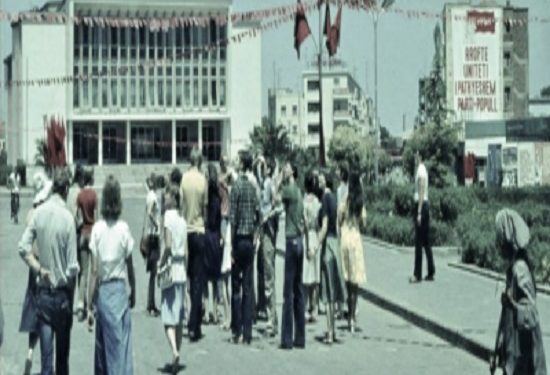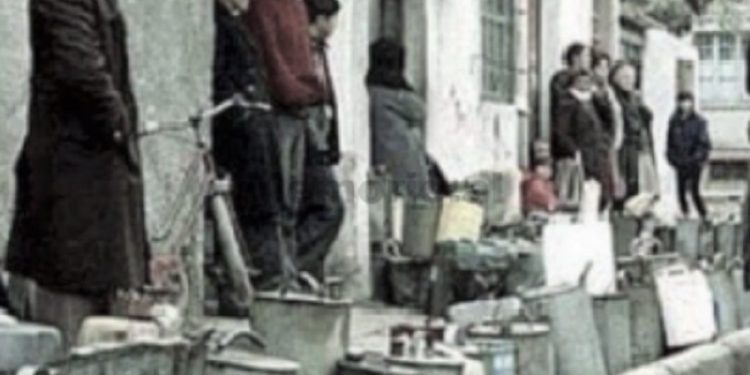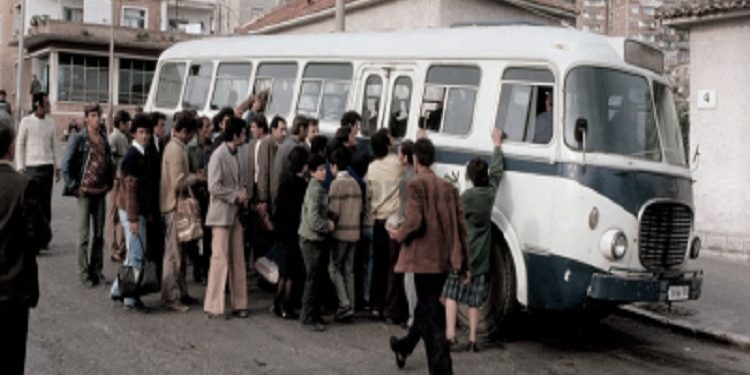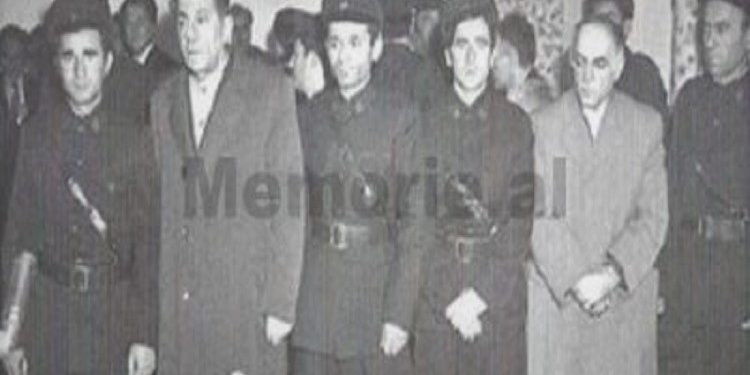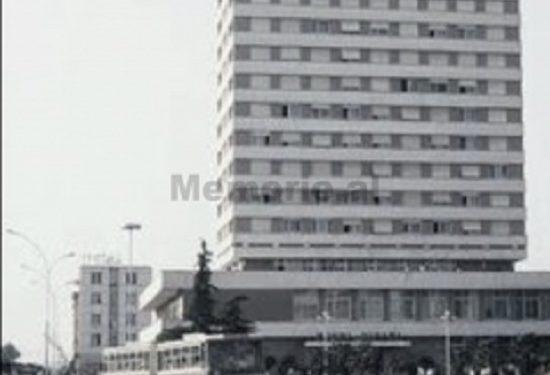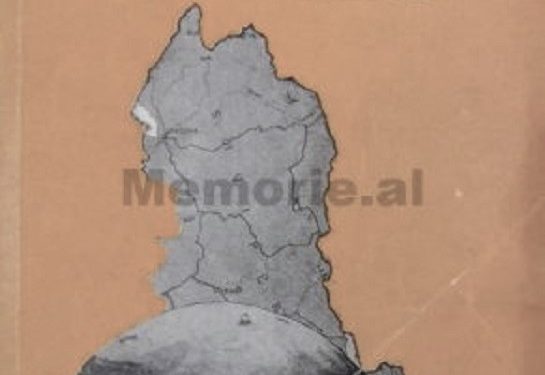Dashnor Kaloçi
Memorie.al/ publishes some excerpts from the book unknown to Albanian readers, entitled “Albania of Enver Hoxha” which was published in 1981 in Belgrade, by a group of journalists of the state news agency “TANJUG”, of the former Yugoslavia of Tito and later translated and published in Albanian in Prishtina. What does that book say about the communist regime in Tirana and personally about the dictator Enver Hoxha?
Less than three or four months after the beginning of the mass demonstrations of all the people of Kosovo in the spring of 1981 who rose up for their rights and freedoms violated and oppressed by the Titoist regime in Belgrade, a group of journalists of the state news agency of Yugoslavia of that time, TANJUG, published a book entitled “Albania of Enver Hoxha”, a book which in July of that year was translated and published in Albanian in Kosovo by the Publishing House. Rilindja” of Prishtina, describing them as “Special Edition”? Although the book in question was a more than realistic reflection of what has been happening for years in the communist Albania of Enver Hoxha, starting from: the complete isolation of the country from the outside world, the way of life of Albanians, the lack of vehicles private, foreign tourists controlling them who just got off the plane at Rinas airport for their clothes, beards and long hair, curfew syndrome and bunkerization of the country for fear of imaginary enemies, official inflated propaganda with all means of mass communication (Radio-Television, “Zeri i Popullit” newspaper, etc.), where it was said that “Albania is the only socialist country in the world and fights only American imperialism and Soviet revisionism”, the giant slogans that read “Let’s break the blockade and the imperialist-revisionist siege” ”Or“ chrome breaks the blockade ”, etc., the foreign Marxist-Leninist delegations and groups that were called to the Congresses of the ALP to create the image that communist Albania had friends everywhere in the world. ote, the few foreign tourists who visited the country and were controlled everywhere, the extremely difficult economic situation where the communist leadership of Tirana had turned the country, and to end the purges that the communist dictator was doing to his close associates, the publication of That book, at a time when the whole world was paying close attention to the events in Kosovo, clearly had a clear political background. After presenting the darker sides of the communist regime in Tirana and its communist dictator, Enver Hoxha, Belgrade’s propaganda aimed to lower the image of Albanians in the eyes of the world and also of Kosovars themselves, who had their eyes on their homeland. Without entering into these analyzes, from the book in question we have selected only one chapter, which we are publishing without any change from the original version, always according to the Albanian translation of the Prishtina edition in 1981.
Albanian curfew syndrome
“Welcome to the only truly democratic country in the world.” With these words pronounced in the tone of official pathos, in April of this year, the official “tourist guide” received the group of British tourists as he approached the border line confused. Prior to this, travelers were given “tourist guides” in English, in which foreign guests were given instructions and precise information on how to enter Albania, how to behave, and where to circulate. In this trip, which the “guide” repeats in case someone has not read it, it is said that the tourist pants cannot be too “bell-shaped” nor in “very light colors”. Tourists with mini or maxi skirts cannot enter, nor use these until they are in Albania.
If the border guards consider that the clothes of a tourist are “inappropriate”, respectively unacceptable for Albanians, they can ask him to change before crossing the border. Of course, if he rejects this, for him the ramp (beam) will remain released…! Men with long hair and beards were also not allowed to enter. Customs officers also look carefully at their personal luggage, and pick up books and magazines that are considered to have political, religious, or pornographic content.
After this ceremony, which to many tourists accustomed to the opening of European borders will be confusing, foreigners will tread on the ground of this country in which, Stalin monuments are one of the obvious features. Thus, with these official “instructions” and “information”, the tourist will enter this country, which the chroniclers called “the lonely European”, and some even “European desert”.
Hostility obsession
These years of Albania’s loneliness were brought to him by Enver Hoxha, the man in the dictatorial shadow of whom this country has been living for almost four decades now. In this period, which is not short in the history of a people, Albania, despite the European process of opening borders and bringing peoples closer, became more and more lonely and increasingly isolated. Today it could almost be said that she, for some things in this world is alone. In his political career, Enver Hoxha did a lot to create Albania’s external “enemies”. This has become his obsession, from which he is not getting rid of even today. The whole world has turned against small Albania, both the capitalist and imperialist countries, the neighboring “revisionist” Yugoslavia and the “revisionists” from Moscow and their descendants from Beijing and many others.
There are rare, very rare cases when Enver Hoxha talks about the friends of Albania. All his books, what is more than thirty, his speeches, writings talk about the “enemies” of Albania, about those who have just not swallowed his country. From this gradually arose the syndrome of the siege of Albania, which so convincingly characterizes the present moment of Albania.
This syndrome of siege that was imposed on you and, it could be said, planted the whole nation, promoted a few years ago the campaign of “bunkering of Albania”. In Albania, concrete bunkers germinate like mushrooms after rain. About these concrete bunkers, a French journalist wrote the following impressions from the end of 1980: “As soon as it is trampled on Albanian soil, a phenomenon stands out. Everywhere one looks – along the roads, in towns and villages, on the slopes of the shores, in the fields and in the mountains – everywhere like inverted plates are seen these strange bunkers, which today are almost part of the ordinary landscape of Albania, in villages as well as in cities.
In the form of spheres, made of reinforced concrete and erected on deep pits, usually camouflaged with bushes and, with one or more turrets, these small fortifications, the photography of which is strictly forbidden, are provided in order. first for airborne protection. The Albanian leaders, certainly proud of these bunkers, claim that only nuclear weapons can destroy them… “This construction of bunkers has become almost a disease in this country. Some foreign travelers claim that in some localities in the interior of the country citizens build houses with turrets! They also claim that Albania spends more iron and concrete on the construction of these bunkers than on the construction of residential buildings.
The whole country lives under the anxiety of siege and possible aggression. But from whom? Even the Albanians themselves cannot say this accurately, although this syndrome of state siege is being planted in everyone. Through the pages of newspapers, from the walls of houses and slogans in the streets, through the national radio, the population is constantly bombarded with messages of “vigilance” and called to be ready to defend the country, that socialism must be built “with a pickaxe in one hand and with a rifle in the other ”.
Enver Hoxha invented the blockade of his country, although no one blocked it. At the entrance of the city in Shkodra, the passing passenger is greeted by the slogan: “To fulfill all our obligations and break the blockade”! Such a slogan is also encountered in Tirana: “We will break the blockade and the imperialist-revisionist siege”. The life of Enver Hoxha, in his efforts full of stalemate to maintain personal power, the fabrication of “enemies” and the disappearance of “enemies”, played a crucial role. Enver Hoxha attacked and cursed “enemies” even abroad, and wiped out those in the country. The latter, in short, according to his own statement, “threw them in the trash” (trash. Our note, D.K.). Why do Enver Hoxha and his followers invent the “enemies” of the Albanians, why do they always frighten their people with aggression, which has just begun?
Why Tirana “fights” with everyone, when all European countries, as well as the whole world, try with all their might to find a common language, to make possible the processes of reducing tension and to eliminate more and more border divisions between peoples? Why is Albania the only country in Europe that is not involved in the CSCE processes? These questions are more difficult to understand than to explain. Enver Hoxha quarreled with the world. His enemies are all – socialist countries, capitalist countries, rich and poor, neighboring Yugoslavia, and distant China. Enver Hoxha simply does not agree with the other world.
Ideological shell
In all this there is a legitimacy, a permanent red thread, according to which acrobatic oscillations were brought to the attitudes and thoughts of Enver Hoxha. Hoxha was and remained consistent with Stalin until the end. From Stalinism, from the worst, most conspiratorial component of Stalinism, he created the “ideological shell”, into which he was immersed for life. This loyalty to Stalin is one of the two constants of his ideological thought and political activity. Enver Hoxha was most afraid of change, reform, and softening on the side of the communist labor movement in any socialist country with which he was in alliance and in friendly relations.
As a distinguished demagogue, he realized that it was precisely democracy and openness that threatened him the greatest danger. For this reason, the “Yugoslav” case was and remains the target of his constant attacks and preoccupations. His dictatorial regime, closed and repressive, is certainly frightened to the point of panic by the infectious action of the “northern example”. For this reason, Hoxha embraced with both hands the Stalinist anathema of Tito’s Yugoslavia, and only then, in a stricter and more filthy way than the others, did he launch an attack against “Yugoslav revisionism”. When one browses Hoxha’s books and his speeches of the last three decades, one easily comes to the conclusion that is almost shocking: Enver Hoxha accepted and deregistered his main friends the most, according to what was their attitude towards revisionism Yugoslav.
Later in the communist and labor movement the change and democratization of relations was achieved, when the various communist parties reviewed their attitudes towards Yugoslavia, Enver Hoxha not only remained in the old positions, but also began to sever relations with those parties. His slogan then was, it seems that he remained even today “my enemy’s friend, he cannot be my friend”. In this obsession of creating external enemies, Hoxha almost chose no means. He overthrew the old greats, cursed his friends until yesterday, insulted his comrades for their ideology and weapons, cursed statesmen and prominent politicians. All of them, according to him, are: “thugs”, “traitors”, “fools”, “fools”, “fascists”, “murmurers”, “megalomaniacs”, etc.
Only Stalin, as a foreign journalist wrote, escaped without entering Hoxha’s gallery of thieves. Things have been going on like this for several decades now, but the question that definitely arises is this: how did Hoxha manage to stay so alone and lonely, how does he manage to maintain a certain “independence” not to say isolation of himself, which would be the best word , in such a place, on the edge of Europe, in the heart of the Mediterranean. The issue is very difficult to explain when it comes to the Albanian people. There are many observers who often ask the question: How is it possible that the brave and proud Albanian people do not see the hopeless situation of such a position, how is it possible that Albania is so lonely, out of time and space!?
At first glance, say rare travelers from Albania, the situation in the country is stable and calm, but no one denies that in Albania there is social unrest and political conflicts. For these permanent resistances, deep and internal in the Albanian society, speak clearly and unequivocally the permanent, extensive and ruthless purges and deportations to the internment camps which Enver Hoxha implements from time to time – from war to today – against its closest associates and citizens in general, which in some cases reaches even high levels in municipalities and enterprises. Here Hoxha was more efficient and more consistent. What happens in Albania at the time of official life is not easy to see. The world knows very little about Albania. Albania is an underground prison; it is almost hermetically sealed. When a foreign tourist asked the Albanian guide to explain something from the political life of the country, he replied: Everything you are interested in Albania, you will find in the pages of “Zeri i Popullit” or in the shows of Radio Tirana “. / Memorie.al




